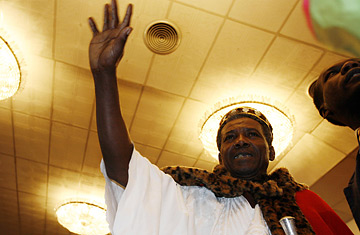
Julio Pinedo greets the audience after being crowned as the Afro-Bolivian king by members of the community of African descendents that live in near La Paz, Bolivia.
Bolivia may be better known for its llamas, snow-capped Andean peaks and indigenous populist President than as a seat of African royalty. Yet Bolivia is home to the only known African monarch in the Western hemisphere — and as of last Monday, King Julio Pinedo is the first in his family's regal Congolese line to be officially recognized by the Bolivian state.
"It's a glorious day for Afro-Bolivians," said Marfa Inofuentes of the Saya Afro-Bolivian Cultural Movement, during Monday's ceremony. "Today, Bolivia and the world have to acknowledge that Bolivia is not just indigenous, it's black too."
But the formal nod from the Bolivian government to a traditional Afro-Bolivian authority does not yet signal general acceptance of Bolivian blackness. The 25,000 surviving descendants of the over half million slaves brought from Central Africa to work in Bolivia's high altitude mines are a largely forgotten community. Their history is breezed over in textbooks, and when the 2001 national census asked Bolivians to identify their ethnicity, Afro-Bolivians were forced to check Other.
When not being altogether ignored, the group is popularly viewed as objects of derisive superstition. In a custom dating back to slavery, indigenous Bolivians pinch passing Afro-Bolivians to grab some of the luck the slaves are said to have brought to the native people — with Afros around, the indigenous people were no longer at the bottom of Bolivia's racial hierarchy.
The current generation of Afro-Bolivians, however are, economically at least, on par with Bolivia's 36 native groups. They live mainly in the Yungas region a few hours east of La Paz, where the 30,000 Afro-Bolivians who survived life at 14,000 feet were brought in the mid-1800s when slavery was abolished. After another century of indentured servitude on plantations, the Afros stayed in the area, making a decent enough living growing coffee, coca, bananas and rice in South America's poorest nation.
Like many transplanted groups, Afro-Bolivians created a cultural identity by mixing the old with the new. From their ancestral homelands, they've maintained funeral rituals and medicinal secrets, as well as music based on the saya drum and the koancha (a hollow gourd percussion instrument). But their mixing with the indigenous Aymara is just as notable: Afro-Bolivians wear the same layered pollera skirts and bowler hats that distinguish the indigenous group with whom they share the subtropical region. And the Afros' language is a blend of Aymara and Spanish.
Forging a political identity has been harder. No Afro-Bolivian has ever served as mayor, let alone held a seat in Parliament. Even in Bolivia's current era of indigenous political power, they remain on the sidelines, being neither native nor white (as Spanish descendants are called here). Still, they are hoping to ride the current leftist wave; specifically, they want name recognition in the country's new constitution.
"We aren't in Bolivia by choice. We were brought here by force and made to forget our customs," says Martina Padredos, an Afro-Bolivian from the Yungas who came to the city for Monday's coronation. "The least the state can do is recognize that we are members of this country too."
The demand to be named in the constitution is crucial, say Afro-Bolivian activists, after decades of government officials denying responsibility for the group's welfare because the constitution doesn't mention their existence. And despite the absence of Afro-Bolivians from the 255-seat constitutional assembly, the Afros are likely to win their demand because it has the support of President Evo Morales' Movement Towards Socialism party.
And then there's another victory for the group in the form of the new official political status of King Julio. Grandson of Bonifacio (the first in the royal line to figure publicly in the Afro community), Julio is a respected leader, according to Yungas residents. Serving as a kind of justice of the peace-cum-moral authority, he presides over holiday celebrations and resolves familial land disputes. His community hopes his official recognition by the state will see him step up his advocacy on behalf of his people.
But King Julio didn't mention his future plans when he took the podium on Monday after being crowned. In fact, he said little to the 200-person audience gathered in the four-star hotel auditorium following the street parade that got the Monday morning crowd in La Paz's Plaza Murillo bouncing to the Saya beat. The King actually seemed ill at ease during the entire event. Not that he's a stranger to public appearances; he may simply have been put off-balance by his surroundings. After all, it was his first visit to the city.
